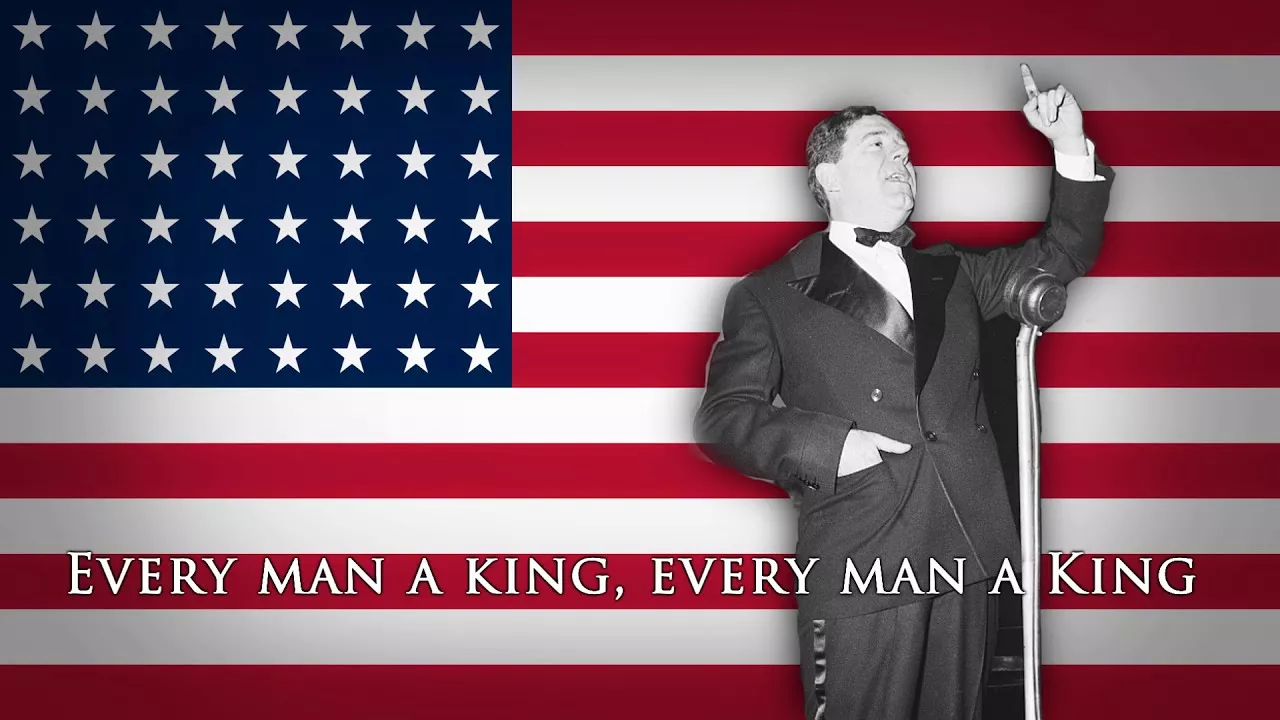Hue P. long was a US senator (1932-1935), and he also served formerly as the governor of Louisiana (1928-1932). Long delivered the speech “every man a king” on the radio about the distribution of wealth in the US. It was a broadcast of 30 min duration; along with criticizing contemporary wealth distribution, he also presented the idea of society: “share our wealth”. The idea was based on limiting wealth and its equal distribution between rich and poor. He used the Bible, past presidential information and economic statistics to support his ideas.
Hue P. long was an avowed articulator; the reason behind this was the usage of his rhetorical techniques. The inculcation of the religious rhetorics was more significant in the latter half of his political career, much like the faithful preacher Long mentioned hope and salvation in his speech for that particular cohort who was already afflicted by the social discrepancy. The use of pathos throughout the address made it impactful.
“… people today are seeing their children hungry, tired, half-naked, lifting their tear-dimmed eyes into the sad faces of their fathers and mothers… (Long)”
Referring to economic inequality, Long criticized the contemporary governments for failing to provide necessities to average American families. Without relying on the hamminess, Long appealed by weaving out emotions. Quite vigilantly, Long used religious ideas as a backup to convince the general public that he had the rightful solution for all their problems. This religious and emotional narration not only formed the backbones of the “share our wealth” idea but also earned him the spiritual image of “saviour”.
“… I believe that was the judgement and the view and the law of the lord, that we would have to distribute the wealth every so often… (Long)”
Long was not only famous for his exceptional oratory skills but also for his photographic memory in terms of remembering statistics. His speeches were often marked with quoting statistics and giving logical proof of what he wanted to convey. From quoting Greek philosophers Socrates or Plato to citing the figures in his speech, Long didn’t turn any stone unturned that meant to add oomph to his oration.
“ …You would have to have 45 times the entire money supply of the United States today to pay the debts of the people of America… (Long)”
Long also used logos in describing his “share our wealth” agenda.
Long knew the tactics of making his audience believe in him. It is where the listener, reader or critic can trace the extensive use of the ethos. Presenting the idea of “sharing our wealth” was marked by Long’s style of emotionalism and conviction. To add to this, the use of ethos to emphasize self-assuredness earned him a great deal of popularity. Long was somehow victorious in creating an impact on the lower middle class,
“…lower-class rural whites in Louisiana found themselves voiceless until the entry of Huey Long into state politics… ( Sindler, 99).”
Like a typical demagogic speech, the speech of Huey also followed a classic psychological pattern of persuasion. The address also exhibited staged development, starting from guilt and victimization, it raised the emotions of the audience and then build the plot for redemption and salvation. This persuasive development of emotions has long been granted as long’s skill in leading his audience. The religious aspects, like asking for redemption from God and quoting the Bible, were one of the reasons for the discourse’s popularity. Like once, a newsman recalled that:
“Better than any other politician I’ve known, Huey knew what his audiences wanted to hear.”
The above statement is an undisputed fact, as Hue was commonly perceived as the articulator for the common people. His demagogic discourse, delivered with a lively vernacular style, won the hearts of many of his followers. However, critically analyzing the demands and suggestions put forward by Long, the speech and plan were more demagogic rather than practical. As a matter of fact, he used religious rhetoric as a means to achieve political success.
